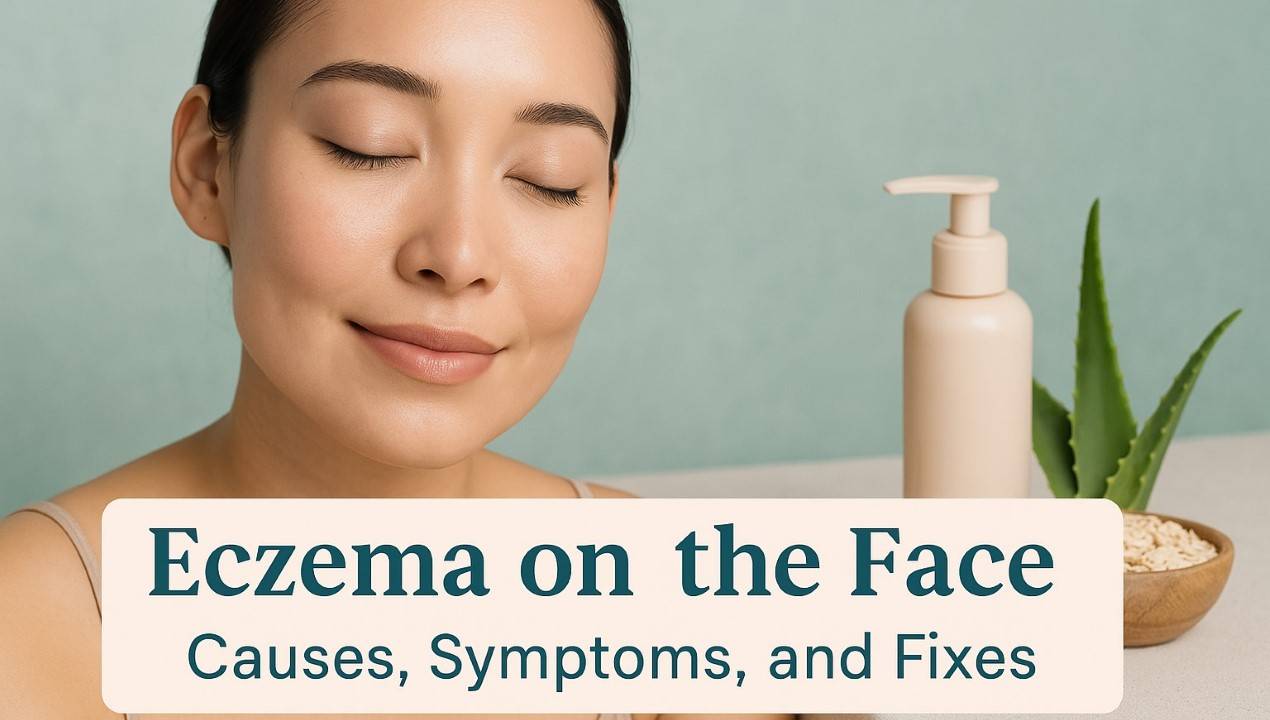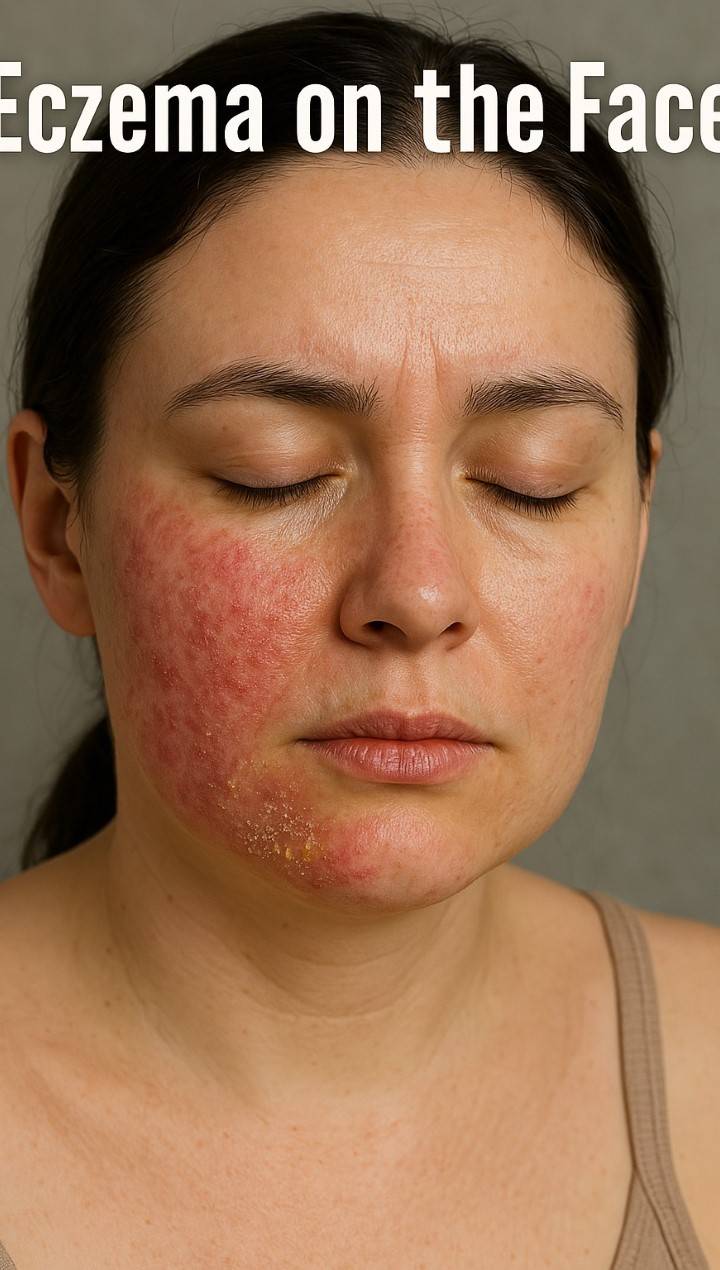Eczema on the face can make your skin red, itchy, and uncomfortable. It’s tough to deal with because it’s so visible. I’ve seen how it can make people feel shy or frustrated. The good news? You can soothe it with simple steps like gentle moisturizers and avoid triggers. This guide explains the causes, symptoms, and easy fixes for Eczema flare-ups on facial skin. Let’s find relief together!

What Is Eczema on the Face?
Red, scratchy facial patches indicate eczema. It often appears on the cheeks, forehead, or around the eyes. It can affect babies, kids, or adults. I’ve noticed it can be extra hard because everyone can see it. Your skin dries and becomes irritated, and flare-ups occur intermittently. The skin on your face is thin and sensitive. This makes red dry patches on the face more noticeable. But with the right care, you can calm it down.
Read more about: Eczema Lips: Causes, Treatments, and Prevention Tips
Why Does Eczema Happen on the Face?
Your face is exposed to many things. Sun, wind, and products can irritate it. The skin’s protective layer is weak in eczema. This lets irritants cause eczema flare-ups on facial skin. I’ve seen how a new soap or cold weather can exacerbate red, dry patches on the face. Understanding its cause lets you prevent it.
Causes of Eczema on the Face
Many things can cause Atopic dermatitis face. Here are the main ones:
- Dry skin: When skin lacks moisture, it gets itchy.
- Allergies: Pollen, pet hair, or foods can trigger facial eczema treatment needs.
- Chemical-heavy soaps and cosmetics that irritate the skin.
- Weather: Cold, dry air, or heat can spark red dry patches on the face
. - Stress: Feeling worried can make flare-ups worse.
- Genes: If your family has eczema, you might get it.
Common Triggers to Watch For
Some things cause red, dry patches on the face to worsen. Avoid these:
- Scented lotions or perfumes
- Rough fabrics like wool
- Hot showers that dry skin
- Foods like dairy or eggs
I like checking labels to avoid triggers. It’s an easy way to relieve itchy skin on the face.
Symptoms of Eczema on the Face
How do you spot itchy skin on the face? Look for these signs:
- Red or pink patches
- Itchy, tight skin
- Dry, flaky, or scaly areas
- Minor bumps or blisters
- Burning or stinging
These can come and go. I’ve noticed that eczema flare-ups on my cheeks are common in winter. If you see these, you can start fixing the Atopic dermatitis face.
When to See a Doctor
Most eczema on the face is mild. But see a doctor if:
- Skin is very red or swollen
- It oozes or crusts
- Itch keeps you awake
- Home fixes don’t help
A doctor can offer topical treatments for facial eczema or other help. I’ve seen how a quick visit can calm severe Eczema flare-ups on facial skin
Fixes for Eczema on the Face
Let’s explore how to fix itchy skin on the face. These tips are simple and safe. Test each option individually to discover what suits you.
1. Moisturize Every Day
Dry skin worsens eczema on the face. Use a fragrance-free moisturizer. Apply it two to three times daily, especially after washing. Look for the best moisturizers for eczema-prone skin with ingredients like ceramides. I’ve tested thick creams, and they work successfully for dry skin face relief. This keeps skin soft and less itchy.
2. Use Gentle Cleansers
Harsh soaps irritate eczema on the face. Choose to gentle cleansers for facial eczema. Use lukewarm water, not hot. Pat dry with a soft towel. I like this because it’s easy and helps with sensitive skin care. It’s a key step for eczema flare-ups on facial skin.
3. Don’t Scratch
Scratching makes eczema on the face worse. It can cause infections. Keep nails short. Try cool compresses to calm itching. I’ve seen this help with soothing facial eczema. At night, cotton gloves can stop scratching.
4. Add a Humidifier
Dry air triggers eczema on the face. A humidifier adds moisture to your room. Use it in your bedroom, especially in winter. I’ve noticed this helps with dry patches on my face. A quick tweak for thriving eczema skincare.
5. Try Oatmeal Baths
Oatmeal soothes itchy skin. Add colloidal oatmeal to a lukewarm bath. Soak for 10–15 minutes. This is one of the best natural remedies for face eczema. I love this because it feels calming. Moisturize right after for Eczema flare-ups on facial skin for relief.
6. Watch Your Diet
Some foods trigger eczema on the face. Dairy, eggs, or nuts are common culprits. Keep a food diary to track diet changes to help with facial eczema. I’ve seen cutting out triggers help with face redness treatment. Talk to a doctor if you suspect food allergies.
7. Use Sunscreen
The sun can worsen eczema on the face. Use mineral-based sunscreen with zinc oxide. Apply it daily, even if it’s cloudy. I like this for sun protection for eczema-prone skin. It protects and prevents eczema flare-ups face.
8. Manage Stress
Stress can spark eczema on the face. Try relaxing with deep breathing or a short walk. I’ve noticed this helps with managing redness and itching in facial eczema. A calm mind supports unblemished skin.
9. Try Hydrocortisone Cream
Low-strength hydrocortisone cream can ease itching. Use it thinly for a few days. Check with a doctor first. I’ve seen it helps with topical treatments for Facial eczema symptoms and signs. It’s a quick fix for Eczema flare-ups on facial skin.
10. Seeing a Dermatologist
If eczema on the face doesn’t improve, see a skin doctor. They can prescribe stronger facial dermatitis remedies. I’ve seen how their advice clears up stubborn eczema flare-ups on facial skin. Don’t hesitate to get help.
Building a Skincare Routine
A simple routine helps manage eczema on the face. Try this:
- Morning: Wash with a gentle cleanser for facial eczema. Apply moisturizer and sunscreen.
- Daytime: Reapply moisturizer if skin feels dry.
- Night: Cleanse, then use a thick moisturizer for Eczema flare-ups on facial skin.
I like this because it’s quick and works for a skincare routine for facial eczema relief. Stick to it daily.
Avoid These Mistakes
Some habits worsen eczema on the face. Don’t:
- Use scented products
- Rub skin with rough towels
- Take hot showers
- Ignore flare-ups
I’ve seen these mistakes make eczema relief for the face harder. Keep it gentle.
Read also: Eczema around Mouth: Causes, Symptoms, and Relief Tips
Prevention and Trigger Management
Stopping eczema on the face before it starts is key. Managing triggers can keep flare-ups away. I’ve seen how minor changes make a big difference for facial eczema symptoms and signs. Here’s how to prevent and control triggers for clearer skin.
Identify and Avoid Triggers
Triggers are things that make eczema on the face worse. Common ones include harsh soaps, scented makeup, or dry air. Document cheek eczema triggers in a journal. For example, I’ve noticed that switching to fragrance-free products helps with sensitive skin care for eczema. Avoiding triggers like wool scarves or hot showers can prevent red, dry patches on the face.
Stay Consistent with Skincare
A routine prevents eczema on the face. Wash and moisturize daily with gentle skincare for facial eczema. I like using the same products every day because it keeps my skin calm. Skipping moisturizer can lead to itchy skin on the face. Consistency is key for eczema relief on the face. [
Protect Your Skin from the Weather.
Temperature extremes can provoke facial eczema flare-ups. In winter, use a scarf to shield your face from the wind. In summer, wear a hat for sun protection for eczema-prone skin. I’ve seen how covering up helps avoid facial redness relief needs. Always apply a gentle moisturizer before going outside.
Test New Products Carefully
New skincare or makeup can cause eczema on the face. Patch-test new skincare to avoid flare-ups; pick products labelled for sensitive skin. This prevents allergic contact dermatitis.
FAQs About Eczema on the Face
What Triggers Eczema on the Face?
Triggers include dry air, harsh soaps, stress, and allergies. Weather or scented products can also cause eczema flare-ups on facial skin. I’ve seen that avoiding this helps with the eczema flare-up face. Record flare-ups and scrutinize product labels to pinpoint irritants and prevent facial eczema.
What Foods Trigger Eczema?
Foods like dairy, eggs, nuts, or other foods can trigger an eczema flare-up face. It varies by person. A food diary helps find diet changes to help facial eczema. I’ve noticed that cutting out a diary helps some friends. Visit a doctor for allergy screening.
Which deficiency triggers eczema?
Eczema isn’t always about lacking something. But dry skin lacks moisture. Some people need more healthy fats like omega-3s. A weak skin barrier can cause eczema around the eyes and nose. I’ve seen moisturizers help with dry skin face relief. Ask a doctor about supplements.
What Does an Eczema Rash Look Like on the Face?
An eczema rash looks red, dry, or scaly. Tiny bumps or flaky spots may appear. It’s often itchy and can burn. I’ve seen red dry patches on the face on cheeks, or near the eyes. Use moisturizers for an eczema flare-up face to calm it.
Why Facial Eczema Management Is Essential
Clearing eczema on the face boosts confidence. Itchy, red skin can make you feel stressed, but these fixes help. I’ve seen how better skin makes people happier. It’s a big step for comfort and health. Keep using these natural remedies for face eczema, and you’ll see results!

Adel Galal is a health and wellness writer with over 30 years of experience studying and writing about health, fitness, nutrition, and healthy living. He is the founder of NextFitLife.com, where he shares practical, evidence-based guidance to support long-term health at any age. Adel’s mission is simple:
to help people make smarter health choices that fit real life, at any age.



